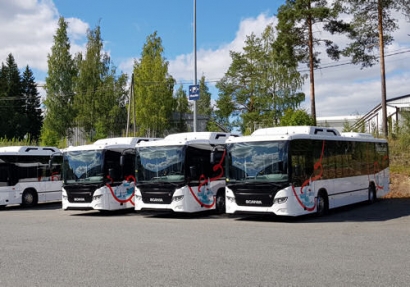
The biogas buses will cover more than 500,000 km each year. Using biogas as their fuel will help cut their annual carbon dioxide emissions by almost 500 tons. In terms of kilometres driven by, for example, a diesel-fueled estate car, this equates 1,100 times all the way up and down Finland from Hanko to Utsjoki and back.
Low local emissions reduce urban pollution
The transport use of biogas can help reduce fuel lifecycle greenhouse gas emissions by up to 90%. In addition, biogas use only generates a fraction of local emissions such as nitrogen oxide and fine particulate emissions compared with conventional fuels. It is also important to note that using gas vehicles enables compliance with the EU Clean Vehicles Directive in public transport.
”It’s great that we’re able to offer cleaner public transport for people in Hämeenlinna. As far as we know, we’re the first and only bus company using environmentally friendly fuel forms in the area. It’s important for us to take environmental considerations into account in our investments in the future, too,” says Vekka Group CEO Tomi Vasiljev.
”It’s been great to see in recent years how well the gas vehicles supplied by us have performed. All of our customers have been pleased with their purchases without any exceptions. Gas-powered vehicles have many superior characteristics that currently make them a highly viable option when considering the investment specifically from the environmental, lifecycle emissions and overall economic perspectives. Gas vehicle technology is reliable, the vehicles are quiet and gas buses provide excellent passenger comfort in urban traffic,” says Scania Finland Oy Key Account Manager Ilkka Korpela.
Buses supporting City of Hämeenlinna strategy
Using biogas buses in Hämeenlinna public transport is an excellent match to the City of Hämeenlinna resource wisdom objective. The objective also includes increasing the use of sustainable transport and alternative fuels, which is also reflected in competitive tendering relating to public transport.
”It’s been a pleasure to cooperate with the Vekka Group, and it’s great to find that interest in gas-powered buses is clearly on the increase. Among the renewable fuels, biogas is one of the most economical options for public transport emission reductions,” says Gasum Sales Manager Ville Sipponen.
Demand for gas in the Hämeenlinna area has been increasing rapidly in recent years as regards passenger cars and heavy-duty vehicles alike. Gasum has responded to this demand by increasing the service capacity of Hämeenlinna’s Tiiriö filling station through the installation of a larger gas storage unit and an additional compressor.
Low-emission biogas is produced at Gasum biogas plants in accordance with circular-economy principles from biodegradable waste such as household biowaste, food waste from grocery stores and municipal sewage sludge.

